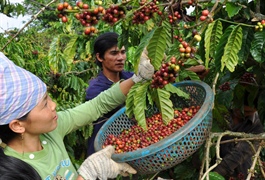Farmers suffer as animal feed prices continue to rise
Farmers suffer as animal feed prices continue to rise
The price of livestock fodder has risen by 45-70 per cent over late 2020 because of higher input prices, inflicting heavy losses on farmers.

Nguyen Quang Vinh, a pig farmer in Dong Nai Province’s Bien Hoa City, said the price of a 25kg bag of bran has increased from VND250,000 to VND410,000 (US$11-17.8) since October 2020.
The prices of raw materials used for feed, like corn, rice bran, and fish flour, have been rising continuously during the period.
But farmers cannot hike prices of poultry or cattle correspondingly, since they have to compete with cheap imported products.
After the Tet (Lunar New Year) holiday in early February, many animal feed products have seen a fresh price increase – by about 22 per cent for soybean oil, 21 per cent for soybeans, 16 per cent for soybean meal and 9 per cent for corn.
The main reason for this is adverse weather in South American countries that provide a large volume of raw materials for feed production in the world.
Transportation costs have also been increasing constantly and the latest petrol and oil price hikes have upped the pressure.
In addition, Russia’s military operation in Ukraine is having a great impact on corn and wheat prices at home and abroad, the Dan Viet newspaper reported.
Major corn importer
Viet Nam is the largest corn importer in Southeast Asia and is forecast to be the fifth-largest importer in the world, allowing foreign animal feed suppliers to expand their trade in the country.
According to the General Department of Vietnam Customs (GDC), the import turnover of animal feed and raw materials reached nearly $4.14 billion in the first 10 months of 2021, up 29 per cent on the same period in 2020.
The GDC estimates that this number will continue to grow, providing opportunities for corn and fermented by-products (DDGS) exporters around the world to increase their trade with Viet Nam.
The cost of animal feed accounts for 65-70 per cent of the production cost in the livestock sector. Therefore, the record increase in prices of animal feed materials has caused huge difficulties and challenges for the domestic livestock industry, especially pig farming.
Nguyen Kim Doan, deputy head of Dong Nai Livestock Association said with the current price of pig feed, farmers will need to spend more than VND4,000,000 ($173) on feed to raise a pig of 100kg weight.
Meanwhile, live hog prices have been at a low level for a long time at only VND54,000-60,000 ($2.35-2.6) per kilo, he added.
Pham Duc Binh, deputy chairman of the Viet Nam Animal Feed Association, said animal feed production is controlled by importers and foreign businesses, while all the maize used for the production of animal feed is imported.
Viet Nam only produces rice bran and cassava, and has failed to develop areas to grow feed inputs because of poor productivity, and the animal feed supply chain has not developed comprehensively, he added.
The dependence on imports and the sharp increase in global prices of raw materials due to crop failures and China buying record quantities, has resulted in sharp input price increases.
Another problem is the lack of empty containers, which are stuck in various ports around the world, to transport goods. This has been a factor in imported raw materials becoming more expensive.
Binh said the State should plan raw material areas and issue preferential credit policies for domestic companies in order to reduce dependence on foreign enterprises and become more competitive.



























